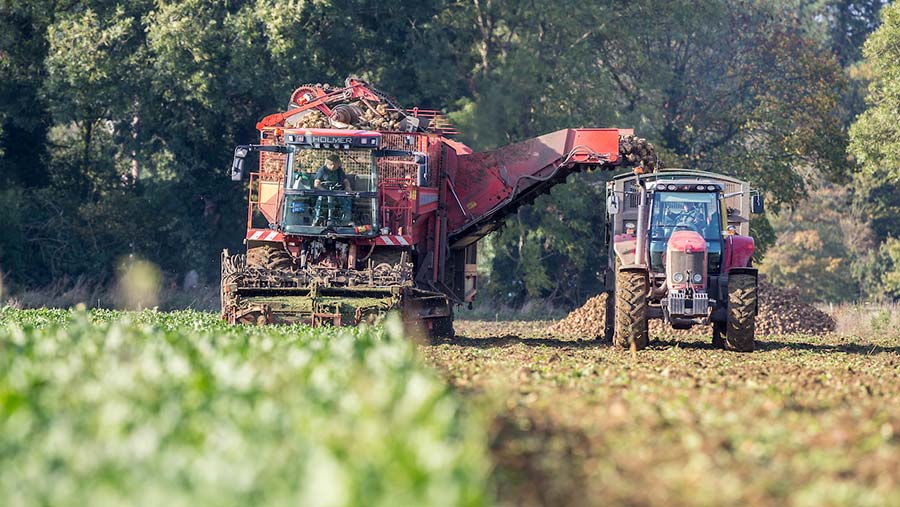Huge variability in first sugar beet yields across the East
 © Tim Scrivener
© Tim Scrivener Sugar beet growers are reporting huge variability in yields in the early weeks of the harvest campaign after the dry spring and summer drought placed crops under pressure across eastern England.
Some growers were forced to delay their start to the beet harvest this autumn after poor establishment in the spring, while summer drought restricting root growth had raised concerns over poor crop yields. But after a sluggish start, the beet lifting campaign is building momentum.
Overall, yields are not looking as bad as first feared; some growers are reporting excellent yields above 100t/ha, but for others yields are average, or below average.
See also: Crop Watch: Volunteer beans and Barley Yellow Dwarf Virus
The NFU Sugar board vice-chairman Simon Smith currently grows and delivers about 65,000t of sugar beet into British Sugar’s Bury St Edmunds factory.
He confirmed there was a lot of variability in beet yields across regions.
Mr Smith said his yields so far this harvest had ranged between 24t/ha and 120t/ha, but expects to be at least 10% below average.
“Yields are extremely variable and those who managed to establish a crop and then got late rain in May are faring much better than those who didn’t,” said Mr Smith, who farms close to the Cambridgeshire-Suffolk border.
Bury growers ‘hit hardest’
NFU Sugar board chairman Michael Sly said growers in the Bury St Edmunds area had seen their yields hit hardest after the summer drought. While growers supplying British Sugar’s Wissington factory were also reporting lower-than-average yields.
Mr Sly grows about 13,500t of beet in the Fens of north Cambridgeshire and south Lincolnshire. His yields were more stable, ranging between 75t/ha and 95t/ha.
Although there are three months left of the beet harvesting campaign, Mr Sly predicts beet yields will be below their national five-year average of 75t/ha.
Lincolnshire grower Andrew Ward is feeling more upbeat about his yields. He grows about 49ha of sugar beet on heavy and light land at Glebe Farm, Leadenham, near Lincoln.
About one-third of his beet on heavy land still needs to be harvested, and the crop on the light land will be lifted in January. All the beet is delivered to British Sugar’s factory in Newark, about 12 miles away.
“The average yield we need to fulfil our contract is 95t/ha and we’re easily doing that,” Mr Ward said.
“We have recorded a high of 109t/ha. Our sugar content is running at about 17.6%, which is good.”
Mr Ward has been surprised by the good yields, considering the dry growing conditions. “We had neonic-treated seed and I think it showed, because when you look at our crops, they are really green. I’m sure that’s had a lot to do with the good yields,” he said.
Yields variable
Sugar beet grower and haulier Tom Craven grows about 220ha of sugar beet in Stickford, north of Boston. His beet lifted so far is averaging between 85-90t/ha.
“Sugar beet yields are phenomenal in places and not so good in others,” said Mr Craven.
“Yields are ranging from 60t/ha to 130t/ha on the silts along the A17 corridor in the Holbeach and Terrington St Clement areas. Considering the summer drought, this is quite remarkable.
“In the areas where we did not think yields would be good, they are better than expected. For example, in the Newark area, yields are averaging 75t/ha when we thought they would be 60t/ha.”
Sugar content in general was poor to start with but has improved and levelled off at about 17% on average, he added.
Mr Craven also runs Craven Transport, an agricultural bulk haulage company based at Poplar Farm, Stickford, in partnership with his father, Andrew, and brother, James.
The company provides beet loading and haulage services for about 120 growers, totalling 400,000-500,000t/year, with many under the British Sugar’s managed beet haulage scheme.
Mr Craven reckons beet deliveries from his haulage group are running about 10 days behind due to the slow start.
Beet lifting campaign ‘going well’, says British Sugar
British Sugar insists this year’s beet lifting campaign is progressing well, despite the delayed start.
Dan Green, agriculture director at sole processor of UK sugar beet, said: “Drought conditions over the summer, as well as the arrival of the beet moth in autumn, have undoubtedly meant there is variability, but the crop is resilient and we have adapted our campaign to help improve performance and yields.
“As we hoped, when we took the decision to delay openings of the sites, lifting conditions have been excellent following late-September rain and we have seen good crop development in most areas.
“We have invested in our sites over the summer months and I am pleased to report that the factories are performing well.”

